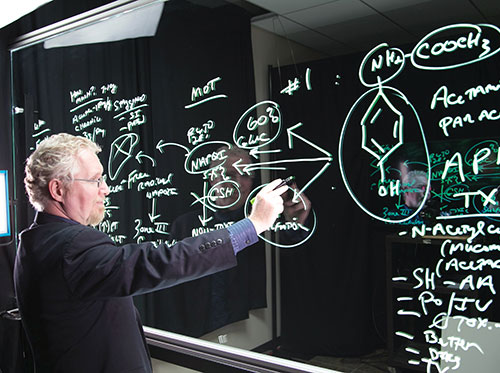
Sean Nordt demonstrates the Lightboard.
A Lightboard is a large, illuminated glass board that can be written on using special grease pens. Unlike with traditional whiteboards that require instructors to turn their backs to the audience, the instructor can simply stand behind the glass to write and lecture more naturally. A camera in front of the Lightboard records the lesson as a mirror image so text reads normally without the instructor having to write backwards. The instructor can see the recording in real time on a television behind the camera, almost like teaching into a mirror. During the recording, a video team can superimpose images translucent enough for the instructor to highlight and write on directly.
Patrick Crispen, EdD, director of educational technology and assistant professor of clinical medical education at Keck School of Medicine, initiated the idea of a Lightboard studio to better support the flipped classroom education model.
Reuben Elias, manager of learning spaces, and Indra Wangsawiredja, distance education operations engineer, assisted Crispen with building the studio. Materials, which included a professional-grade camera, high output fluorescent lights and custom polished glass, cost around $15,000. Because the marker ink does not erase as easily on the Lightboard’s glass as on a whiteboard, the technology is ideal for videos fewer than six minutes long that do not require completely erasing the board mid-lesson.
On Jan. 27, Sean Nordt, MD, PharmD, associate professor of emergency medicine, was the first professor to make a pre-recorded Lightboard lecture — a five-minute lesson on Tylenol poisoning.
“We do a lot of bedside teaching in both emergency medicine and toxicology,” Nordt said. “I typically give this lesson on a piece of paper, but this is a much better setup for me and for my students. I could plan out entire lesson plans and record them over a day.” The recording session lasted about ten minutes and Nordt received his recording the next day.
Keck School faculty can contact the Center for Innovative Medical Education at cimet@usc.edu to arrange live streams and recording sessions. The service is free of charge for medical education materials.
by Mary Dacuma